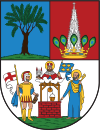Wieden (Wiener Gemeindebezirk)
| Wieden | ||
|---|---|---|
| 4th District of Vienna | ||
|
||
 Location of the district within Vienna |
||
| Country | Austria | |
| City | Vienna | |
| Government | ||
| • District Director | Leopold Plasch (SPÖ) | |
| • First Deputy | Lea Halbwidl (SPÖ) | |
| • Second Deputy | Barbara Neuroth (Green) | |
| • Representation (40 Members) |
SPÖ 13, Green 11, ÖVP 7, FPÖ 6, NEOS 3 |
|
| Area | ||
| • Total | 1.80 km2 (0.69 sq mi) | |
| Population (2016-01-01) | ||
| • Total | 32,745 | |
| • Density | 18,000/km2 (47,000/sq mi) | |
| Postal code | A-1040 | |
| Address of District Office |
Favoritenstraße 18 A-1040 Wien |
|
| Website | www.wien.gv.at /bezirke/wieden/ |
|
Wieden (German pronunciation: [ˈviːdn̩] (![]() listen)) is the 4th municipal District of Vienna, Austria (German: 4. Bezirk). It is near the centre of Vienna and was established as a district in 1850, but its borders were changed later. Wieden is a small region near the city centre. After World War II, Wieden was part of the Soviet sector of Vienna for 10 years.
listen)) is the 4th municipal District of Vienna, Austria (German: 4. Bezirk). It is near the centre of Vienna and was established as a district in 1850, but its borders were changed later. Wieden is a small region near the city centre. After World War II, Wieden was part of the Soviet sector of Vienna for 10 years.
The name Wieden was first recorded in 1137, and is thus the oldest Vorstadt (former municipality within the Linienwall) of Vienna. The main street (Wiedner Hauptstraße) is certainly even older. The district was the site of the former royal Summer residence, which was completed under Ferdinand II, and was expanded many times until Maria Theresa sold it to the Jesuits. Today it is the Theresianum, a prestigious private boarding school, while the Diplomatic Academy of Vienna resides in a wing of the building.
In the beginning of the 18th century, the development of Wieden as a suburb began. Many palaces and other buildings were built. Two small Vorstädte in the area of the present fourth district were Hungelbrunn and Schamburgergrund.
...
Wikipedia

